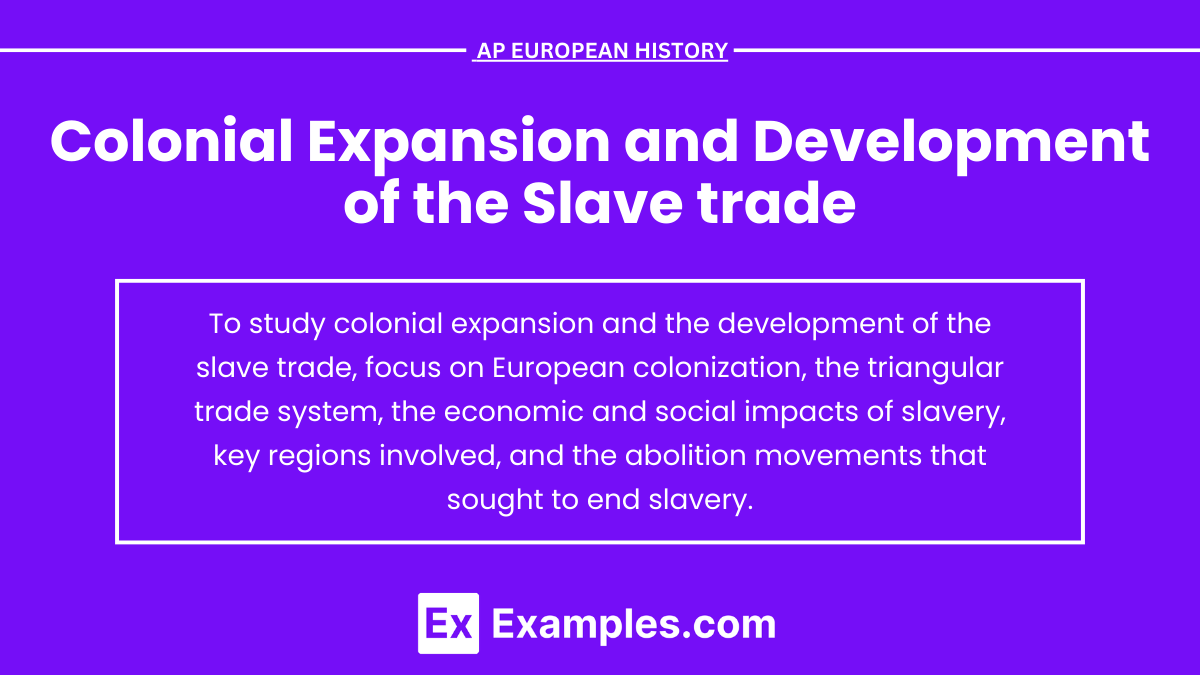Colonial expansion, a major phase in European history from the 15th to 19th centuries, involved European nations establishing overseas empires. Driven by economic ambitions, political power, and religious motives, countries like Spain, Portugal, England, and France sought new territories. This expansion fueled the transatlantic slave trade, which became a cornerstone of colonial economies. African slaves were forcibly transported to work on plantations, profoundly shaping the economic, social, and cultural landscapes of the Americas and Europe. The slave trade’s legacy remains significant in world history.
Learning Objectives
In AP European History, studying “Colonial Expansion and Development of the Slave Trade” involves understanding the economic, political, and religious motivations behind European colonialism. Focus on the transatlantic slave trade, including the triangular trade system, its impact on Africa, Europe, and the Americas, and the major colonial powers involved. Analyze the economic benefits and moral issues surrounding the slave trade, and understand the factors leading to its decline and the long-term effects on modern society.
Introduction to Colonial Expansion
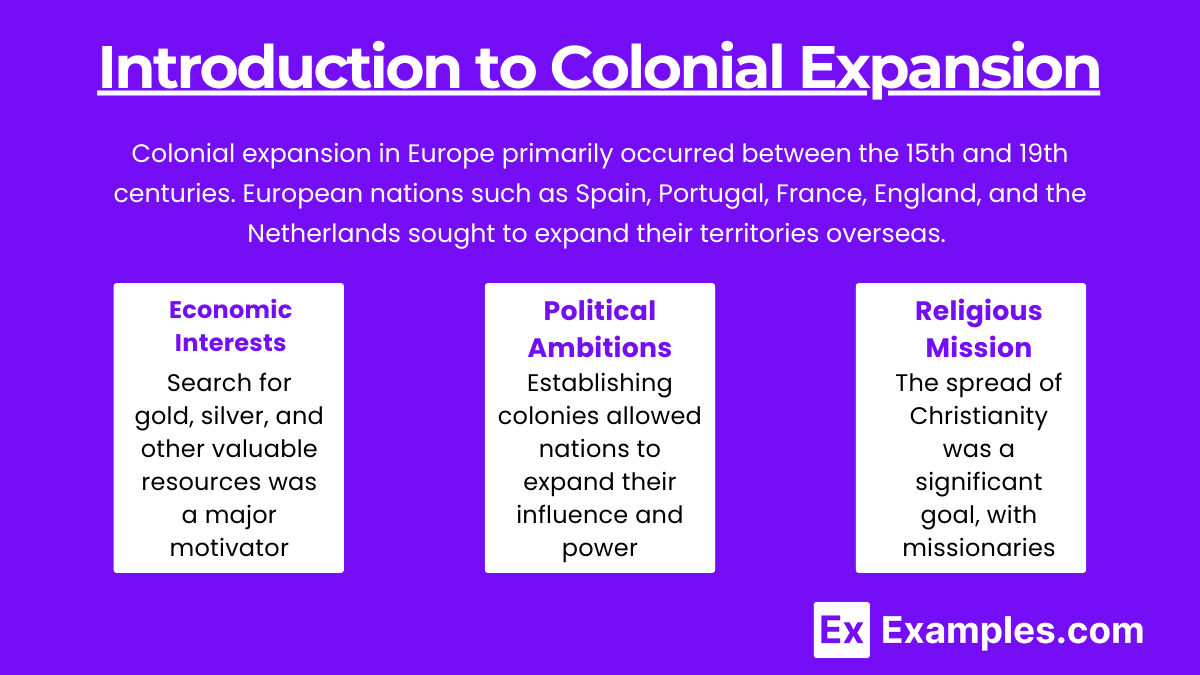
Colonial expansion in Europe primarily occurred between the 15th and 19th centuries. European nations such as Spain, Portugal, France, England, and the Netherlands sought to expand their territories overseas. This era, known as the Age of Exploration, was driven by several factors, including the search for new trade routes, the desire for wealth and resources, and the spread of Christianity.
Key Motivations for Colonial Expansion
- Economic Interests: The search for gold, silver, and other valuable resources was a major motivator. European nations also sought new markets for their goods and access to exotic products like spices, silk, and precious stones.
- Political Ambitions: Establishing colonies allowed nations to expand their influence and power, often at the expense of rival nations.
- Religious Mission: The spread of Christianity was a significant goal, with missionaries often accompanying explorers to convert indigenous peoples.
The Role of the Slave Trade in Colonial Expansion
The transatlantic slave trade was a crucial component of European colonial expansion, particularly in the Americas. The demand for labor on plantations growing sugar, tobacco, cotton, and other cash crops led to the mass importation of African slaves.
The Origins of the Slave Trade
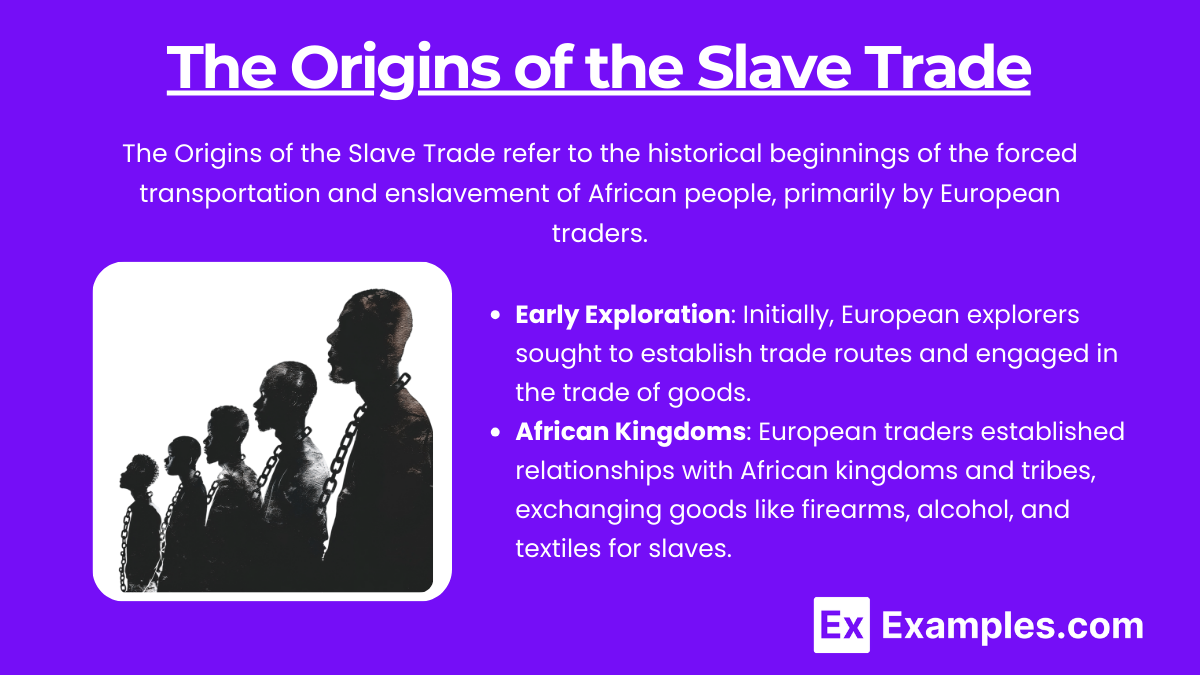
The Origins of the Slave Trade refer to the historical beginnings of the forced transportation and enslavement of African people, primarily by European traders. Initially, European explorers focused on establishing trade routes and exchanging goods. However, the establishment of colonies in the Americas led to a labor shortage, as indigenous populations declined due to disease and conflict. To meet this demand, European traders formed alliances with African kingdoms and tribes, trading goods such as firearms, alcohol, and textiles in exchange for enslaved Africans, thus establishing the transatlantic slave trade.
- Early Exploration: Initially, European explorers sought to establish trade routes and engaged in the trade of goods. However, the establishment of colonies in the Americas created a demand for labor that could not be met by the local indigenous populations due to diseases and warfare.
- African Kingdoms: European traders established relationships with African kingdoms and tribes, exchanging goods like firearms, alcohol, and textiles for slaves.
The Triangular Trade System
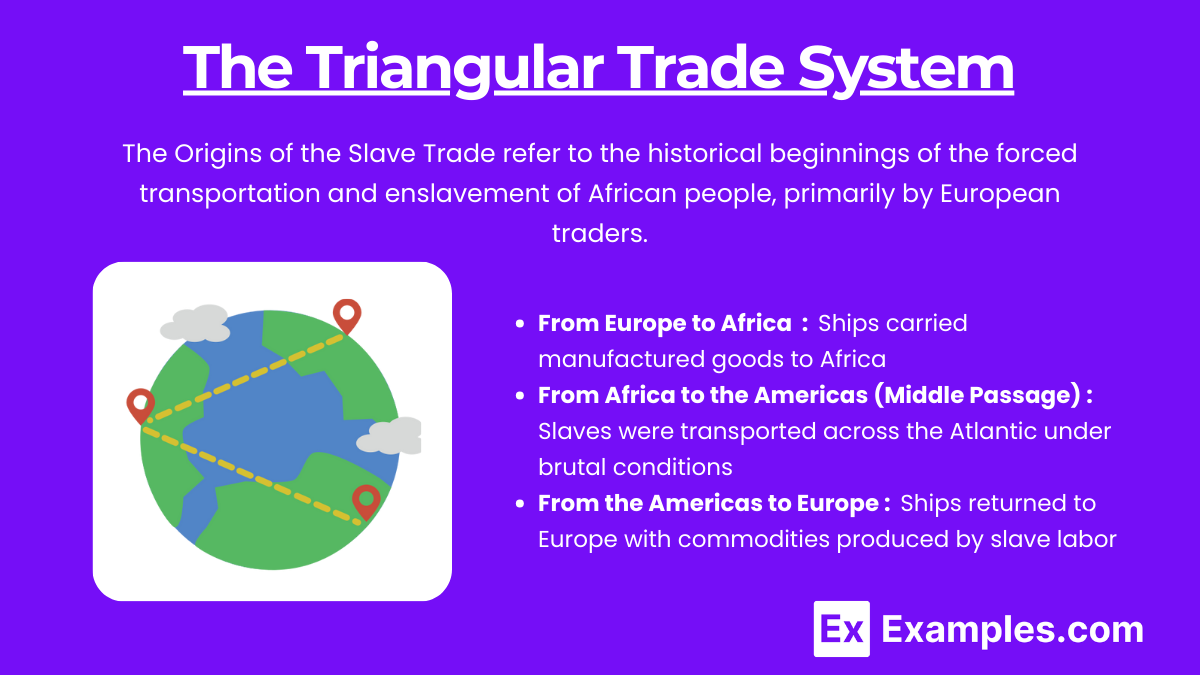
The Triangular Trade System refers to a historical network of trade routes between Europe, Africa, and the Americas during the 16th to 19th centuries. This system involved the exchange of goods, enslaved Africans, and raw materials. European ships transported manufactured goods to Africa, exchanged them for enslaved people, who were then transported under inhumane conditions to the Americas (the Middle Passage). The final leg involved transporting commodities like sugar, tobacco, and cotton, produced by slave labor, back to Europe. This trade system was a key component of the transatlantic slave trade and had profound economic and social impacts.
The transatlantic slave trade was organized as part of a triangular trade system involving three stages:
- From Europe to Africa: Ships carried manufactured goods to Africa.
- From Africa to the Americas (Middle Passage): Slaves were transported across the Atlantic under brutal conditions, leading to high mortality rates.
- From the Americas to Europe: Ships returned to Europe with commodities produced by slave labor, such as sugar, tobacco, and cotton.
The Impact of the Slave Trade
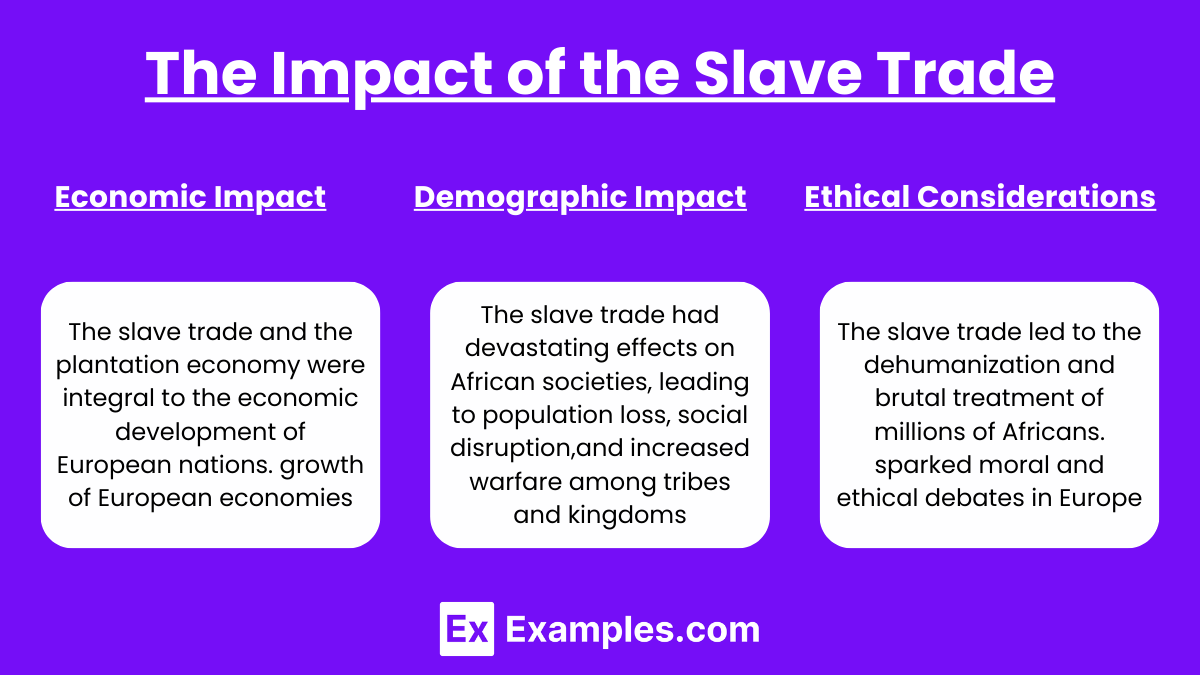
- Economic Impact: The slave trade and the plantation economy were integral to the economic development of European nations. The wealth generated from colonial plantations and the slave trade significantly contributed to the growth of European economies.
- Social and Demographic Impact: The slave trade had devastating effects on African societies, leading to population loss, social disruption, and increased warfare among tribes and kingdoms.
- Cultural and Ethical Considerations: The slave trade led to the dehumanization and brutal treatment of millions of Africans. Over time, this sparked moral and ethical debates in Europe, contributing to the rise of abolitionist movements.
Major European Powers and Their Colonial Ventures
- Spain and Portugal: The Treaty of Tordesillas (1494) divided the newly discovered lands outside Europe between the Spanish and Portuguese empires. Spain focused on the Americas, establishing colonies in the Caribbean, Central and South America. Portugal established a strong presence in Brazil and parts of Africa and Asia.
- France: French colonial ventures included Canada, the Caribbean, and parts of West Africa and Southeast Asia.
- England: England established colonies along the Atlantic coast of North America, in the Caribbean, and later in India and Africa.
- The Netherlands: Dutch colonial efforts were concentrated in the Caribbean, Southeast Asia, and parts of Africa.
The Decline of the Slave Trade and Colonialism
The decline of the transatlantic slave trade began in the late 18th century, influenced by several factors:
- Abolitionist Movements: Humanitarian campaigns in Europe and the Americas highlighted the moral and ethical issues surrounding slavery.
- Economic Changes: The Industrial Revolution shifted the economic focus from agriculture to industry, reducing the reliance on slave labor.
- Legal Changes: Countries began passing laws to abolish the slave trade and slavery, such as the British Slave Trade Act of 1807 and the U.S. abolition of slavery in 1865.
Colonial Expansion and Development of the Slave Trade: 5 Key Examples
- Portuguese Colonies: The Portuguese transported African slaves to work on sugar plantations in Brazil, boosting their economy.
- Spanish Americas: As indigenous populations declined, Spain relied more on African slaves for labor in Caribbean, Mexican, and Peruvian colonies.
- British Colonies: The British used African slaves in Caribbean and North American colonies, particularly on tobacco, sugar, and cotton plantations.
- French Caribbean: French colonies like Saint-Domingue relied heavily on African slaves for sugar and coffee production.
- Dutch Involvement: The Dutch West India Company traded slaves to the Caribbean and North America, using slave labor in Suriname and other colonies.
Practice Questions on Colonial Expansion and Development of the Slave Trade
Question 1:
What was one of the primary economic motivations for European colonial powers to engage in the transatlantic slave trade?
A) To establish trade routes to Asia
B) To support the industrialization of their own countries
C) To supply labor for plantation economies in the Americas
D) To spread European cultural values
Answer: C) To supply labor for plantation economies in the Americas
Explanation:
The transatlantic slave trade was primarily driven by the demand for labor in the Americas, particularly on plantations that produced cash crops like sugar, tobacco, and cotton. European colonizers found it economically advantageous to use enslaved Africans to work these plantations due to the high labor demands and harsh conditions. This labor system was integral to the economic development of European colonial powers during this period.
Question 2:
Which of the following was a consequence of the triangular trade system?
A) Increased cultural exchange between Europe and Africa
B) The spread of European diseases to Native American populations
C) The accumulation of wealth and capital in European nations
D) The reduction of European emigration to the Americas
Answer: C) The accumulation of wealth and capital in European nations
Explanation:
The triangular trade system facilitated the exchange of goods and enslaved people between Europe, Africa, and the Americas. European nations exported manufactured goods to Africa, where they were traded for enslaved Africans. These enslaved individuals were then transported to the Americas and sold, with the proceeds being used to purchase raw materials and cash crops, which were then shipped back to Europe. This cycle generated significant wealth and capital for European countries, contributing to their economic growth and the expansion of their global influence.
Question 3:
How did the development of the slave trade impact African societies?
A) It led to the unification of African kingdoms
B) It caused significant depopulation and social disruption
C) It introduced advanced European technology and education
D) It resulted in the establishment of democratic governments in Africa
Answer: B) It caused significant depopulation and social disruption
Explanation:
The transatlantic slave trade had a profound and often devastating impact on African societies. Many communities experienced depopulation due to the capture and forced removal of millions of individuals, which led to social and economic disruptions. The loss of a significant portion of the young and able-bodied population weakened many African societies, making them more vulnerable to further exploitation and conflict. The trade also disrupted traditional social structures and economies, contributing to long-term instability in the regions affected.

